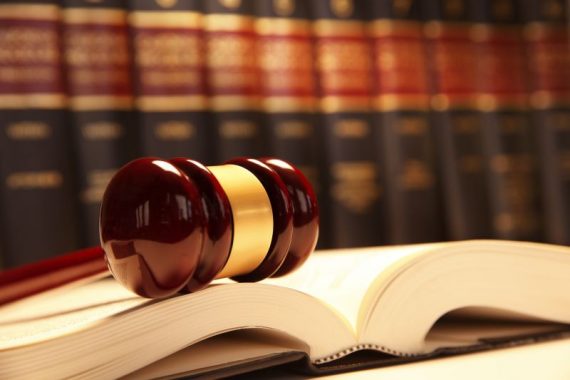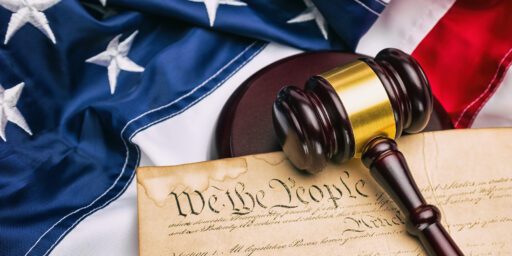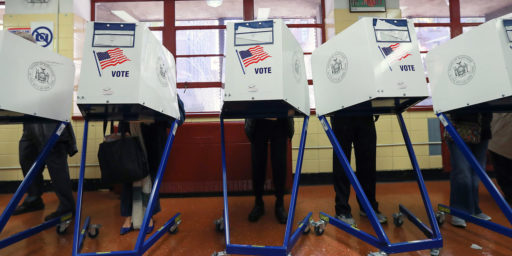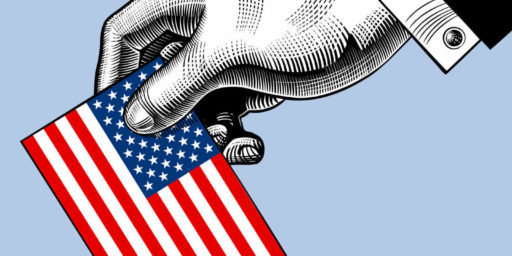SCOTUS’ Consistent Inconsistency on Voting Cases
A defensible distinction could give way to a Constitutional crisis.

The Washington Post headline “Democrats in Pennsylvania, North Carolina claim key wins at Supreme Court ahead of election” may be rather misleading.
Democrats won two significant Supreme Court victories involving voting deadlines in key battleground states Wednesday, as the justices allowed extended periods for receiving mail-in ballots in Pennsylvania and North Carolina.
They declined to disturb decisions that allow Pennsylvania officials to receive ballots cast by Election Day and received within three days, and a ruling by North Carolina’s elections board that set a grace period of nine days.
In both of the cases, the Republican Party and GOP legislators had opposed the extensions, and President Trump has railed on the campaign trail about the mail-in vote.
So, yes, good news for Democrats and a strike against the notion that a Court dominated by Republican-appointed Justices is laying the groundwork to steal the election. Yet, not so fast.
Three conservative justices — Clarence Thomas, Samuel A. Alito Jr. and Neil M. Gorsuch — objected in both cases.
New Justice Amy Coney Barrett did not to participate in either case. Her decision did not signal a blanket recusal in election cases involving Trump, who nominated her, as Democratic senators sought for her to pledge during the confirmation process. Instead, Barrett indicated through a court spokeswoman that the cases needed prompt decisions and that, having started work Tuesday, she did not have time to fully review the legal arguments.
Yeah, no kidding.
So, what explains the inconsistency?
The court in the past few days has confronted deadline extensions for mail-in ballots in three states. It did not allow one in Wisconsin championed by Democrats. The seemingly contradictory decisions appeared based on a difference noted by Chief Justice John G. Roberts Jr.: that the court should be reluctant to approve changes imposed by federal judges, as in Wisconsin, but view those imposed by state courts or agencies differently, as was the case in Pennsylvania and North Carolina.
Emphasis mine. And I happen to agree with Roberts if that’s in fact the basis for his seemingly inconsistent rulings.
But here’s the rub:
Moreover, the issue in Pennsylvania, a state that proved vital to Trump’s election four years ago and is key to his reelection, might not be settled.
Thomas, Alito and Gorsuch signaled that they might want to revisit the case after the election, and even indicated the votes received after Election Day ultimately might not be counted.
The three penned a statement criticizing the ruling by the Pennsylvania Supreme Court that called for three extra days to receive mail-in ballots because of the crush of requests brought on by fears of the coronavirus pandemic, writing that it was probably unconstitutional.
“There is a strong likelihood that the State Supreme Court decision violates the Federal Constitution,” wrote Alito.
“The provisions of the Federal Constitution conferring on state legislatures, not state courts, the authority to make rules governing federal elections would be meaningless if a state court could override the rules adopted by the legislature simply by claiming that a state constitutional provision gave the courts the authority to make whatever rules it thought appropriate for the conduct of a fair election.”
Again, I happen to think that’s correct. Legislatures, not courts, are where the Constitution vests this power.
But, alas, there’s the not insignificant fact that legislatures can act unconstitutionally when exercising their Constitutional authority. Given repeated and sustained evidence that Republican-majority legislatures routinely seek to make it harder for Democratic-leaning constituencies to vote and have their votes counted, the courts have an obligation to ensure they’re not violating the Equal Protection Clause of the 14th Amendment, not to mention the provisions of the Voting Rights Act of 1965 (as amended multiple times since).
Here, though, it seems like judges are substituting their judgment for that of the legislature on mere procedure. Where they derive the authority to extend deadlines is much less clear.
In the Pennsylvania case, though, they at least seem on reasonable footing:
The Pennsylvania Supreme Court decision to grant the extra time was based on a “Free and Equal Elections Clause” in the commonwealth’s constitution.
According to the majority, that provision requires elections to be “conducted in a manner which guarantees, to the greatest degree possible, a voter’s right to equal participation in the electoral process,” and affords courts “broad authority to craft meaningful remedies when required.”
The justices who voted not to accept the Republican request did not explain their reasoning, although the court said additional statements may be forthcoming.
Still, unless there’s some reason Black citizens need more time than their white counterparts to mail in their ballots, it’s unclear how this applies.
Regardless, the notion that the Supreme Court declined to change the deadline yesterday but reserves the right to revisit the matter after the election is chilling. As already noted, I wouldn’t have much problem if they’d ruled that, no, the legislature’s deadline must hold. People would be forced to get their ballots in the mail right away—or to utilize drop boxes if available or to eschew absentee balloting altogether and vote in person—based on that knowledge.
But to allow people to vote late and then potentially not count their votes after the fact? That would be absolutely outrageous.
Again: Either ruling ahead of time would be justifiable. But a two-step that disenfranchised people, presumably disproportionately people voting Democratic, would have to be considered a partisan action by the Supreme Court that would permanently stain the institution’s legitimacy. If the Court’s other conservatives don’t understand that, hopefully Chief Justice Roberts does.






Your attempts to suss out some judicial philosophy behind this is a waste of time. Roberts is the last Republican Justice to even try to come up with arguments based in the law for voting the way he does – and that’s just a fig leaf. Thomas, Alito and Gorsuch are the most brazen in what’s really going on – support their party in any way they can, and do so in the angry and putout manner to which the Republican base responds so well.
What Admiral Ackbar said.
Somebody needs to remind Barrett, and Gorsuch (Kavanaugh being beyond redemption) that they made it, they’re in, Trump can’t un-nominate them. Maintaining a pretense of integrity is now of more value to them than Trump’s gratitude.
I don’t mean to be a dick…but this irks me.
It seems to me that Democracy won.
But as noted, maybe.
I read the three decisions, taken as a whole, as a clear signal that the SCOTUS is just itching for the chance to give this election to Trump.
There are so many issues this election is bringing forth:
1) the unconscionable hoops we make people to go through to get registered, to vote, and to be counted.
2) the idea that one’s vote can be thrown out because of technicalities, even those not of the voter’s making is outrageous
3) the willingness of the powerful (with their legal lackeys) to pretend to be callous about the technicalities (and the hoops) is asking for trouble
Quite frankly, the whole system is rotten and I would not be surprised if violence happens because people cannot find any other way.
I hope there was some explicit racial element described in the background case, because I don’t know why this sentence is there.
It did, however, made me remember Anatole France’s famous quote:
I think this is a fairly weak argument, and I’m surprised Gorsuch in particular would adopt it as justification for a Federal court to intrude on state sovereignty. Yes, under the Federal Constitution, the authority to set election rules is vested in the State legislatures, but those State legislatures are themselves constituted under and derive their powers from their respective State constitutions, which in most (all?) cases, vest the State courts with the power of judicial review. The Thomas/Alito/Gorsuch reasoning seems to ignore that fact entirely and thus to permit State legislatures to make whatever rules they want (as long as they don’t violate other provisions of the Federal Constitution) regardless of whether those rules violate their state constitutions. For example, if the PA State Constitution explicitly required that absentee ballots postmarked before the election but received after the election be counted, the PA State Legislature just ignored that requirement and passed a law prohibiting the counting of all absentee ballots received after election day, and the PA Supreme Court overturned that law, Thomas/Alito/Gorsuch seem to believe the USSC should overrule the PA Supreme Court and defer to the PA Legislature despite the manifest invalidity of the law. It’s absurd.
@R. Dave:
To make the hill for G-A-T higher, the Roberts’ court a few months ago upheld the PA court ordered redistricting because the justification was adherence to the PA constitution. Not to mention the long line of Federalist decisions that the court has made over the last couple of centuries.
Wouldn’t it be ironic that a conservative SC destroys Federalism?
Perhaps by having the mail-sorting machines removed from urban areas?
That nonsense still stinks to high heaven and has not been adequately explained.
And he might. Which is why they were so hot to get a sixth conservative Justice on the Court.
@Sleeping Dog:
Only to the extent that conservatives actually believe in “Federalism” rather than “exclusive rule by our whims.” So, not all that much, no.
This just happened:
Potentially thousands of requested mail ballots lost in Butler County, official says
Who will tell these voters that their ballot is not coming? Who will ensure the good faith effort by citizens to vote as is their right is upheld? Which Supreme Court Justice will say: “I’m sorry. The law is the law.”
the notion that the Supreme Court declined to change the deadline yesterday but reserves the right to revisit the matter after the election is chilling.
I agree. This is absolutely outrageous. They should have either granted an expedited hearing and ruled right f’ing now or refused the case, period.
We all know what’s going to happen (or we should, anyway). The SCOTUS will “review” the case after the election, then declare all ballots received after Nov. 3 to be invalid. People are going to go nuts and march in the streets in protest — and I won’t blame them.
@Scott:
Which Supreme Court Justice will say: “I’m sorry. The law is the law.”
Three guesses!
@Nightcrawler: I think you might need five or six guesses by the time this is done.
As Stalin is often attributed to say: “It’s not the people who vote that count, it’s the people who count the votes.”
(Everything was said by either Stalin, Lincoln, Mark Twain or Oscar Wilde… it’s just a fact.
As Stalin always said: you shouldn’t go swimming for an hour after eating)
If Republicans were able to ensure 8 to 12 hour lines at mailboxes in minority areas, they would do so.
@Nightcrawler:
I believe that, by PA law, some voters are assured that their ballot will be counted if received by 5pm on Nov 10 and postmarked prior to Nov 3 [25 P.S. § 3146.8(g)(1)] .
These voters, UOCAV citizens, are explicitly granted this extension because of anticipated delays in mail delivery. Are domestic citizens, faced with similar anticipated and real mail delays, some how less entitled to sufferage?
IANAL, however it would appear that all citizens are not being treated equally.
BTW, My local Board of Elections insists they mailed my balloting package to me on Oct 13. Sixteen days later, it has not arrived at my (domestic) location
@Bob@Youngstown:
If we had a non-partisan court, absolutely, but we don’t, which is why I won’t blame people for flooding the streets once this ruling comes down. And it will come down, mark my words.
I sincerely hope I am wrong about this.
@Gustopher: I thought it was
But I’m not up on my Stalinivia.
@Gustopher: I don’t think it’s five or 6 guesses; it’s more like 5 or 6 right answers.
Free and equal means that all votes are treated reasonably equally under the law. Absentee ballots cast by military and overseas citizens can be received weeks after Election Day. Mail-in votes are absentee ballots. Treating them differently is a violation of PA’s constitution and the federal constitution (according to 7 justices in bush v gore). It has nothing to do with race.
It doesn’t even take a law degree to figure this out, just a non-partisan observation, a decent civics education and a tiny bit of critical thinking.
@R. Dave: The right wing of SCOTUS (yes, right-wing not conservative) is essentially cancelling judicial review. If they say the constitution doesn’t vest in states the right to structure governing as they see fit, such as by delegating authority through a state constitution and binding the legislature to follow it in enacting laws, then the constitution also does not vest in SCOTUS the right to interpret laws under the constitution.
@Nightcrawler: This way if republicans are losing they can throw a Hail Mary and let the votes get counted by simply refusing to hear the case. If they decided now, they’d have to issue a decision on the record.
The right wing of SCOTUS think more like politicians than jurists.
@MarkedMan:
No, it’s supporting the Constitution. The Constitution says legislatures decide how this is handled. That’s it. So when the legislature makes a deadline, it stands. That’s Free and Equal Elections standards that are constitutional.
Why do so many not understand or read the Constitution?
@Spencer:
no, it’s just reading the Constitution. The constitution says the legislatures control the process, not the legislature with judicial review. The legislatures have the final say in this as long as it meets all other constitutional standards.
Why is this so hard to figure out for some people?